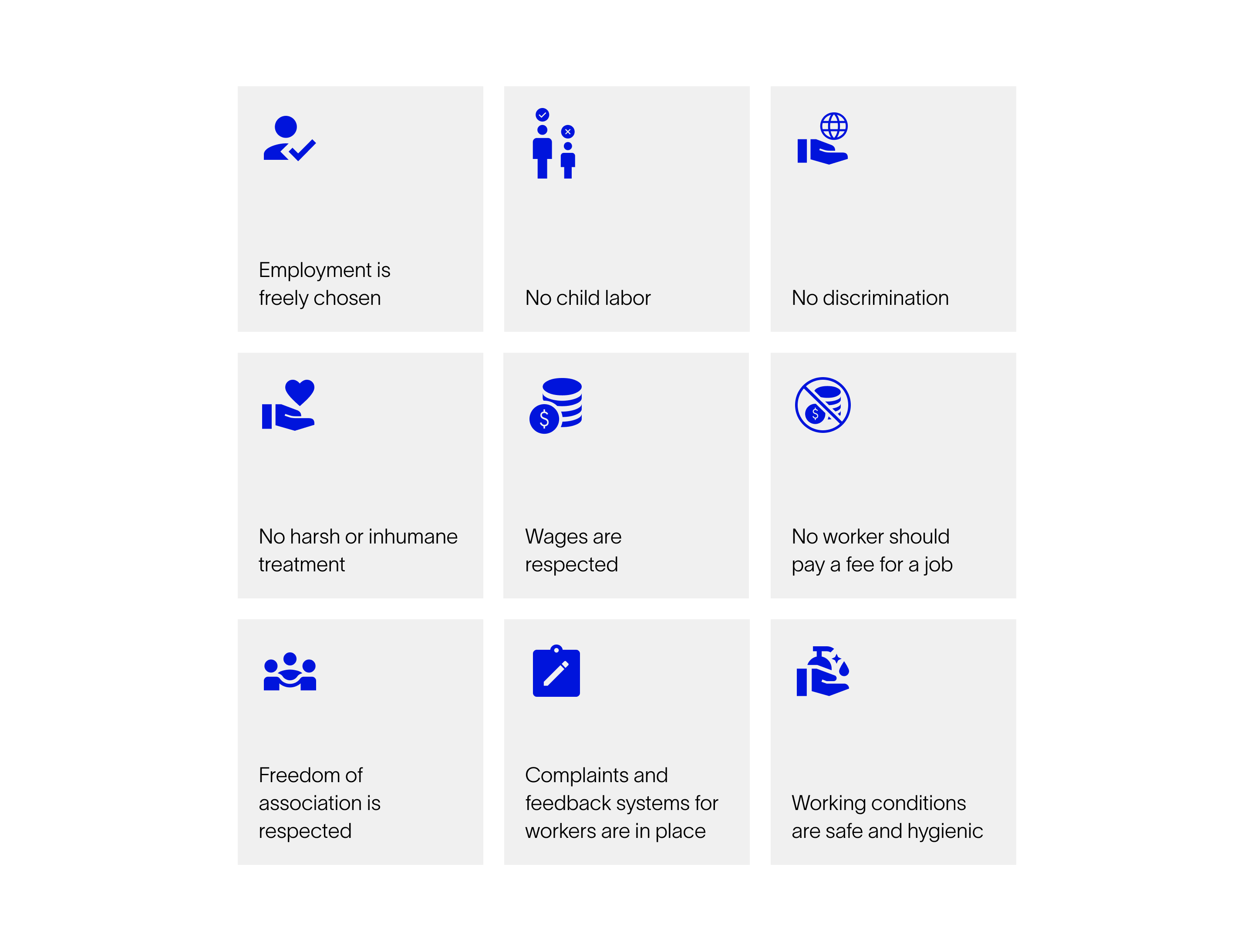Respecting human rights
In our operations, business relationships, and supply chain

Conducting business in a manner that preserves and respects human dignity is fundamental to the sustainable operation of our business. By respecting human rights, we aim to avoid harm, and we have the potential to contribute to more inclusive societies embraced by the UN Sustainable Development Goals.
Respecting human rights is a key expectation of SLB and we publicly commit to supporting the United Nations Guiding Principles on Business and Human Rights and OECD Guidelines for Multinational Enterprises, key references for our human rights program.
We respect human rights in practice by:
- conducting due diligence to identify, assess and manage potential human rights impacts
- making human rights a topic our employees can understand, recognize and act upon
- working with suppliers who respect and comply with our Working Conditions Requirements
- providing mechanisms for employees and third parties to report any human rights concerns.

Our focus areas
Through engagement with our stakeholders, including IPIECA, the global oil and gas industry association for advancing environmental and social performance, we have five focus areas.
Our approach to human rights in the workplace is based on the fundamental principles of our Working Conditions Requirements, which provide a common baseline for the expected treatment of employees, contractors, temporary workers, and trainee workers. Our policies and practices aim to create an inclusive workplace by taking into consideration the rights of all individuals, regardless of nationality, gender identity, religion or belief, ethnic origin, race, sexual orientation, disability, age, or any other status.
SLB requires suppliers to commit to conduct business in a manner that preserves and respects human dignity as set out in the SLB Code of Conduct and Human Rights Position Statement. Our Working Conditions Requirements apply across our supply chain, including suppliers, contractors, and labor agents.
We prohibit any use or contracting—directly or indirectly—of child labor, forced labor, human trafficking, or any form of slavery, and we are committed to continuously monitoring the working conditions performance of our suppliers to promote the rights and welfare of all workers. We are also committed to purchasing parts and products containing minerals that have been procured through a validated conflict-free supply chain.
SLB is committed to avoiding harm to people and working with our customers to maintain a stable operating environment in which communities as well as the energy industry can prosper by
- identifying, preventing, mitigating, and resolving social risks and impacts
- optimizing employment and contracting opportunities for communities
- ensuring that community concerns, issues, or problems are taken seriously.
SLB recognizes the rights of distinct peoples living in various regions to self-determined development and control of ancestral lands. Where activities are undertaken on lands traditionally owned by or under customary use of indigenous peoples, we are committed to building strong relationships with the indigenous communities, interacting respectfully, and helping economically empower indigenous communities where we operate.
In compliance with the SLB Personnel and Asset Security Standard, we develop security arrangements to protect people and assets in a manner that respects human rights and is consistent with applicable laws and international standards, including the Voluntary Principles on Security and Human Rights.
Strong framework to guide our conduct
We have clear governance processes to implement our human rights program. Leveraging our ethics and compliance management system, our Human Rights Framework strengthens our management processes and embeds them in our integrity and internal controls to better identify, assess and mitigate potential human rights adverse risks.
We have a set of core governing documentations that define internal requirements and set out clear expectations throughout the whole organization. It includes our:
- Code of Conduct, which sets out how we are expected to behave, including our responsibility to respect human rights.
- Human Rights Position Statement, which consolidates our human rights commitments and serves as the basis for internal and external engagement on human rights issues.
- Conflict Minerals Position Statement, which describes our commitment to the responsible sourcing of minerals or metals in relation to conflict-affected and high-risk areas.
- Working Conditions Requirements, which defines the minimum standards that we ask our facilities and suppliers to respect and to adhere in relation to workers’ rights and worker welfare.
Our executive management team is responsible for the development and implementation of our sustainability strategies and programs, including human rights, with the oversight of our Board of Directors and its committees. Our line management is directly responsible for the implementation of the Human Rights program.
Additionally, our Human Rights Working Group was formed in 2018, with representatives across the business, to advise on human rights-related risks and to review the operational effectiveness of our human rights program.
The SLB human rights training program is designed to provide our people with a general understanding of human rights issues and our key processes to enable them to speak about, implement our human rights commitments and act upon them. Additional training is available for employees that are identified with touchpoints to human rights. The program is designed to prompt consideration of human rights issues related to their own responsibilities.
We have also made the IPIECA and Building Responsibly online training materials on human rights available to our suppliers. Training is used to raise awareness of our expectations around supplier requirements.
We take a risk-based approach to managing human rights, enabling us to focus resources where human rights issues present the most significant hazard. Understanding where our key risks lie is the starting point for taking action.
We use information from third-party experts, local internal assessments, and supplier self-assessments to identify the primary human rights risks in our operations and supply chain and help us prioritize action items. We continue to evolve how we evaluate and manage human rights risks through our operations, sourcing and supplier management processes. We use a variety of resources and tools to prevent exploitative work practices and modern slavery in our operations and supply chain.
We track our effectiveness in managing human rights risk through biannual reviews overseen by our Human Rights Working Group, feedback provided by customers associated with human rights audits, ongoing dialogue with our suppliers through supplier forums and performance review, reviews of findings through our supplier audit processes, and investigation and analysis of allegations with links to human rights issues.
To hold ourselves accountable to the high standards of our Working Conditions Requirements and improve outcomes for workers around the globe, SLB has developed two complementary assurance programs, aligned with external initiatives such as the Joint Industry Platform on Human Rights, to promote decent work and worker welfare, and assess, address and manage modern slavery risks.
Putting the principles into practice
Our Working Conditions Requirements, beyond different country legal and regulatory requirements, provides a common baseline for the expected treatment of all workers.
These requirements set out nine fundamental principles, consistent with the ILO Declaration, to assist our operations and support our suppliers in addressing key areas of worker vulnerability.



Modern slavery statement
Our Modern Slavery Statement details the prevention of slavery and human trafficking within our own operations, business relationships, and supply chain as well as relevant actions taken in support of our policies and goals in this area.
2024 Modern Slavery StatementAccess to remedy
We are committed to providing access to effective remedy when our activities may cause or contribute to adverse human rights impacts. We encourage third parties to do the same when the impact is linked to our business. We have a range of reporting mechanisms, including an online portal and 24-hour EthicsLine system, as described in our Code of Conduct.
A confidential and anonymous report can be made by anyone inside or outside of the organization in 150+ languages and a specific allegation type has been added into our program to deal with Human Rights specifics allegations.
SLB prohibits retaliation for good faith reporting of a potential or actual violation of our Code of Conduct, our internal requirements, or applicable laws as outlined under our Code of Conduct.
